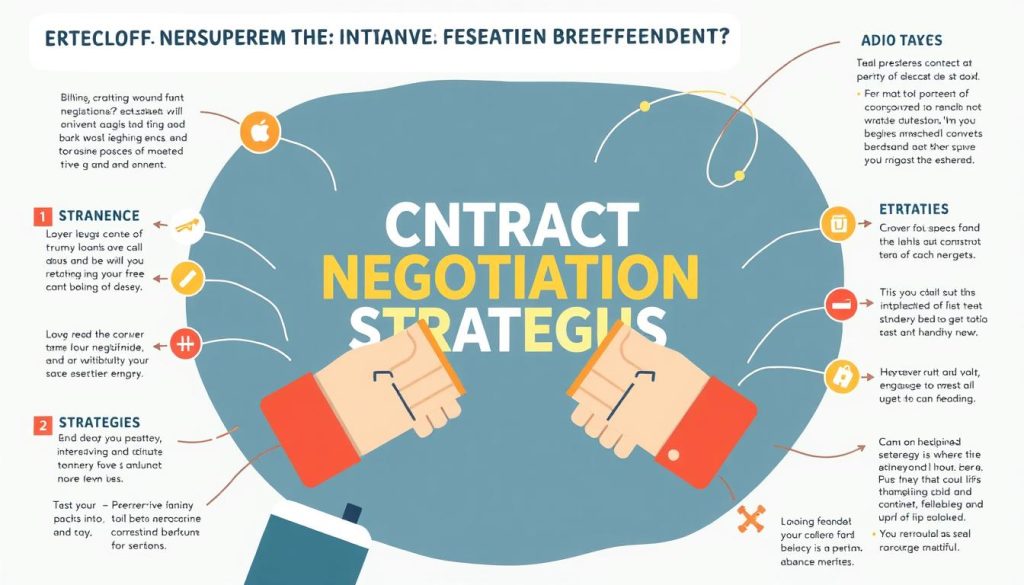As an independent professional, navigating the complex world of contract negotiations can be daunting. Effective negotiation is crucial to securing favorable terms and ensuring the success of your business.
At our organization, we understand the challenges you face in contract negotiations, particularly when dealing with larger clients or organizations. Our comprehensive guide is designed to equip you with the necessary skills and knowledge to navigate the negotiation process confidently.
By mastering the art of negotiation, you can protect your business interests, establish sustainable professional relationships, and create opportunities to add economic value to your work. For more insights on successful negotiation strategies, you can visit our blog post on negotiating wage portage contracts.
Table of Contents
Key Takeaways
- Understand the fundamentals of contract negotiations to secure favorable terms.
- Develop practical strategies tailored to your needs as an independent professional.
- Learn how to protect your business interests and establish sustainable professional relationships.
- Discover how to create opportunities to add economic value to your work.
- Master the negotiation process to confidently navigate difficult scenarios.
Understanding the Fundamentals of Contract Negotiations
Understanding the fundamentals of contract negotiations is crucial for independent professionals seeking to establish a strong foundation for their business endeavors. Contract negotiation is a structured dialogue where parties work to align their interests and reach mutually acceptable terms.
What Defines Contract Negotiations
Contract negotiation is fundamentally about creating a mutually beneficial agreement between parties. It involves a negotiation process that typically includes proposal, counter-proposal, compromise, and eventual agreement on contract terms. Effective contract negotiation requires balancing assertiveness with flexibility to achieve objectives while maintaining positive relationships.
- Contract negotiation is a structured dialogue aimed at reaching mutually acceptable terms.
- The negotiation process involves several steps, including proposal and counter-proposal.
- Effective negotiation balances assertiveness with flexibility.
Why Contract Negotiations Matter for Independent Professionals
For independent professionals, contract negotiations matter because they lack the institutional support and legal resources of larger organizations. The terms established during negotiation directly impact income, workload, timeline, and intellectual property rights. Well-negotiated contracts protect interests, clarify expectations, and provide mechanisms for resolving potential disputes.
- Contract negotiations establish the legal framework governing business relationships.
- Well-negotiated contracts protect your interests and clarify expectations.
- The terms established during negotiations impact various aspects of your business.
Assessing Your Negotiation Style
To navigate contract negotiations successfully, it’s essential to assess your negotiation style. Understanding your natural tendencies and inclinations in negotiations can help you identify areas of strength and weakness.
Common Negotiator Types and Their Strengths
Negotiators typically fall into one of four categories: competitors, accommodators, avoiders, and collaborators. Competitors are assertive and results-oriented, exceling in high-stakes negotiations but potentially damaging relationships. Accommodators focus on building relationships but may make too many concessions. Avoiders tend to sidestep conflicts, potentially missing opportunities, while collaborators are skilled at finding creative solutions but may invest excessive time.
| Negotiator Type | Strengths | Weaknesses |
|---|---|---|
| Competitors | Assertive, results-oriented | May damage relationships |
| Accommodators | Relationship-focused | May make too many concessions |
| Avoiders | Conflict-averse | May miss opportunities |
| Collaborators | Creative problem-solvers | May invest too much time |
How to Leverage Your Natural Style
Recognizing your negotiation style allows you to leverage its strengths and adapt to different situations. By developing flexibility in your negotiation approach, you can respond effectively to various negotiation tactics and styles. This self-awareness helps you prepare for potential pitfalls and develop compensating strategies.
Preparing for Successful Contract Negotiations
The key to successful contract negotiations lies in meticulous preparation and a clear understanding of one’s objectives. As an independent professional, it’s crucial to approach contract negotiations with a strategic mindset, leveraging information and resources to achieve the best possible results.
Research and Information Gathering
Thorough research is the foundation of effective contract negotiation. This involves understanding market rates, standard industry terms, and gathering information about the counterpart’s needs and constraints. By doing so, independent professionals can identify potential areas of agreement and develop a negotiation strategy that aligns with their objectives and interests
Setting Clear Objectives and Priorities
Setting clear objectives is vital to successful contract negotiation. This involves identifying « must-haves » versus « nice-to-haves » before entering negotiations. By prioritizing their needs, independent professionals can focus on achieving the most critical terms and conditions, ensuring a more effective negotiation process.
Developing Your BATNA
Developing a BATNA (Best Alternative to a Negotiated Agreement) gives independent professionals confidence and leverage during the negotiation process. A strong BATNA allows them to establish a clear walk-away point, preventing them from accepting unfavorable terms out of desperation. This strategic approach enables them to negotiate from a position of strength, ultimately achieving better results and success in their contract negotiations.
Essential Contract Terms Independent Professionals Should Focus On

Understanding and negotiating the right contract terms is crucial for independent professionals to ensure their business security and profitability. As you navigate contract negotiations, it’s essential to pay particular attention to certain terms that directly impact your financial stability and operational flexibility.
Payment Terms and Structures
Clear payment terms are vital to ensure consistent cash flow. Specify amounts, timing, methods, and conditions for payment to avoid potential disputes. For instance, you might negotiate a payment schedule that includes milestones or a retainer fee structure. Ensuring that these terms are well-defined will help you manage your finances effectively and reduce the risk of late or missed payments.
Scope of Work and Deliverables
Precise definition of the scope of work and deliverables is necessary to prevent scope creep and establish clear expectations. This includes detailing the specific services to be provided, timelines, and acceptance criteria. By doing so, you can avoid misunderstandings and ensure that both parties are aligned on the project’s objectives and outcomes.
Intellectual Property Rights
Intellectual property rights provisions determine who owns the work you create, which has significant implications for your portfolio and future business opportunities. It’s crucial to negotiate terms that balance your client’s needs with your own interests. For more insights on intellectual property rights, you can explore resources such as this article on intellectual property ownership, which provides valuable guidance on navigating these complex issues.
Termination Clauses and Exit Strategies
Termination clauses protect independent professionals by establishing notice periods, payment for work in progress, and conditions for contract termination. A well-crafted exit strategy ensures a smooth transition and protects both parties’ interests when the business relationship concludes. By including these clauses, you can mitigate potential risks and ensure a more stable business environment.
Powerful Contract Negotiation Strategies for Independent Professionals

To secure favorable terms, independent professionals need to employ robust contract negotiation strategies. Too often, we approach contract negotiation with a narrow mindset, assuming we will be fighting with our counterpart to grab as much as we can. Rather than looking for ways to expand the pie, we focus on carving it up. By contrast, when parties can trade on their preferences across different issues, they reduce the need to haggle over price and percentages.
The Mutual Gains Approach
The mutual gains approach focuses on identifying opportunities where both parties can benefit, moving beyond zero-sum bargaining. Independent professionals can create value by understanding the other party’s priorities and finding creative solutions that address both sides’ interests. This approach encourages collaborative negotiation, where the goal is to achieve a mutually beneficial agreement.
Key aspects of the mutual gains approach include:
- Identifying shared interests and creative solutions
- Understanding the other party’s priorities
- Finding mutually beneficial agreements
Strategic Concession Management
Strategic concession management involves carefully planning which concessions to offer, when to offer them, and what to ask for in return. Small, incremental concessions demonstrate flexibility while preserving your bargaining position and perceived value. This strategy helps maintain a strong negotiating position while showing willingness to compromise.
Effective strategic concession management includes:
- Planning concessions carefully
- Making incremental concessions
- Asking for something in return
Effective Communication Techniques
Effective communication techniques are crucial in contract negotiation. These include active listening, strategic questioning, and clear articulation of your value proposition. Framing proposals in terms of the benefits to the other party increases the likelihood of acceptance. Independent professionals can use anchoring strategies to establish favorable reference points for negotiation.
Key communication techniques include:
- Active listening and strategic questioning
- Clear articulation of your value proposition
- Framing proposals to benefit the other party
By employing these contract negotiation strategies, independent professionals can enhance their negotiation skills and achieve more favorable outcomes. Building rapport and establishing trust creates a negotiation environment where creative problem-solving can flourish. Patience is a powerful strategy; rushing negotiations often leads to suboptimal outcomes for independent professionals. Bundling multiple issues together rather than negotiating them separately often leads to better overall agreements.
Navigating Power Imbalances in Contract Negotiations
In the realm of contract negotiations, power imbalances can significantly impact the outcome for independent professionals. These imbalances often arise when one party has more control over the negotiation terms, resources, or information than the other.
Recognizing Power Dynamics
Recognizing power dynamics is the first step in addressing power imbalances effectively. Sources of power in negotiations include alternatives, expertise, legitimacy, relationships, and information asymmetry. Independent professionals must identify these sources to understand their position and that of the other party.
Building Leverage as an Independent Professional
Building leverage is crucial for independent professionals to counterbalance the power of larger organizations. This can be achieved through specialized expertise, client testimonials, market demand, and cultivating alternative opportunities. Preparation and knowledge are also powerful equalizers that can offset organizational advantages in bargaining power.
| Sources of Power | Description |
|---|---|
| Alternatives | Having other options available |
| Expertise | Possessing specialized knowledge or skills |
| Legitimacy | Being recognized as authoritative or credible |
When to Walk Away from Unfavorable Terms
Understanding when to walk away is crucial; some terms are so unfavorable that no deal is better than a bad deal. Warning signs include unreasonable demands, disrespectful treatment, and terms that undermine your business model. Building a financial buffer gives independent professionals the security to reject unfavorable terms without immediate financial pressure.
By recognizing power dynamics, building leverage, and knowing when to walk away, independent professionals can navigate power imbalances in contract negotiations more effectively.
Technology Tools to Streamline Your Contract Negotiation Process

The contract negotiation process can be complex and time-consuming, but with the right tools, independent professionals can streamline their workflow and achieve better outcomes. Technology tools can significantly simplify the contract negotiation process, saving time and reducing administrative burden.
Contract Management Platforms
Contract management platforms centralize document storage, track versions, and provide templates that standardize your negotiation starting points. For instance, Juro’s negotiation flow allows parties to collaborate on contract changes before adding signatures, and its audit trails capture every edit made to a contract, providing real-time visibility into contract negotiations.
Digital Collaboration Tools
Digital collaboration tools enable real-time editing, commenting, and version control, clarifying the negotiation history and preventing misunderstandings. These tools facilitate a smoother negotiation process, ensuring that all parties are on the same page.
E-Signature Solutions
E-signature solutions accelerate the final stages of contract completion, eliminating delays associated with physical document handling. By leveraging e-signature solutions, independent professionals can expedite the signing process, allowing them to focus on other critical tasks.
By incorporating these technology tools into their workflow, independent professionals can optimize their contract negotiation process, reduce the risk of errors, and improve overall efficiency.
Common Contract Negotiation Mistakes to Avoid

The art of contract negotiation involves more than just reaching an agreement; it requires avoiding common mistakes that can have long-term consequences. Independent professionals must be vigilant in their negotiation efforts to ensure they achieve the best possible outcomes.
Making the First Major Concession
One of the most significant mistakes in contract negotiation is making the first major concession. Don’t make the first major concession, as it can set a precedent that leads to additional concessions and diminished outcomes. Although making the first minor concession can be acceptable, major issues should not be conceded too quickly.
Saying « Yes » Too Quickly
Saying « yes » too quickly can signal that you might have accepted less, potentially devaluing your services and reducing the other party’s satisfaction with the deal. It’s essential to negotiate effectively, ensuring that both parties feel they have worked towards the agreement.
Revealing Too Much Information
Revealing too much information about your constraints, alternatives, or eagerness can be exploited by experienced negotiators. Be cautious with the information you share, as it can impact your negotiation position.
Neglecting Deadline Pressure
Neglecting deadline pressure can lead to rushed concessions as the contract completion date approaches. Understanding the impact of time pressure on negotiations can help you manage the process more effectively.
To illustrate the impact of these mistakes, consider the following table:
| Mistake | Consequence | Prevention Strategy |
|---|---|---|
| Making the first major concession | Leads to additional concessions and diminished outcomes | Negotiate minor concessions first; maintain a strong position on major issues |
| Saying « yes » too quickly | Devalues services and reduces the other party’s satisfaction | Negotiate effectively to ensure both parties feel they have worked towards the agreement |
| Revealing too much information | Exploited by experienced negotiators | Be cautious with the information you share |
| Neglecting deadline pressure | Rushed concessions as the contract completion date approaches | Understand the impact of time pressure on negotiations |
By being aware of these common contract negotiation mistakes, independent professionals can better navigate the negotiation process, achieving more favorable outcomes and maintaining a strong professional position.
Handling Difficult Negotiation Scenarios
In the realm of contract negotiations, independent professionals often encounter challenging scenarios that demand specialized strategies. The COVID-19 pandemic has underscored the importance of being prepared for unexpected challenges, as businesses and individuals alike have had to renegotiate contracts due to unforeseen circumstances.
To navigate these complex situations effectively, it’s crucial to understand the various difficult negotiation scenarios that may arise. This section will explore strategies for dealing with aggressive negotiators, navigating contract renegotiations, and managing cultural differences in international contracts.
Dealing with Aggressive Negotiators
When faced with aggressive negotiators, maintaining composure is key. Focus on interests rather than positions, and use strategic pauses to defuse tension. This approach helps to manage the negotiation dynamics and can lead to more constructive outcomes.
Navigating Contract Renegotiations
Contract renegotiations require a delicate balance between asserting your needs and preserving valuable business relationships. Approaching renegotiations with transparency, documentation of changed circumstances, and creative solutions can increase the likelihood of successful outcomes. It’s essential to be prepared to adapt and find mutually beneficial agreements.
Managing Cultural Differences in International Contracts
In international contracts, cultural differences can create misunderstandings about negotiation pacing, communication styles, and decision-making processes. Independent professionals working internationally should research cultural negotiation norms and consider engaging local experts when necessary to ensure effective negotiation and avoid potential pitfalls.
By understanding and addressing these difficult negotiation scenarios, independent professionals can enhance their negotiation skills and achieve better outcomes in their contract negotiations.
Legal Considerations for Independent Professionals
In the realm of contract negotiations, independent professionals must be well-versed in legal considerations to protect their interests. Understanding the legal framework that governs contracts is crucial for navigating negotiations effectively and avoiding potential pitfalls.
When to Seek Legal Advice
Knowing when to seek legal advice is crucial for independent professionals. Complex deals, unfamiliar terms, high-value contracts, and international agreements typically warrant professional review. It’s essential to recognize the signs that indicate the need for legal counsel to ensure that your rights are protected and your obligations are clearly understood.
Some key scenarios that necessitate legal advice include:
- Contracts involving significant financial commitments
- Agreements with complex or unfamiliar terms
- International contracts subject to foreign laws
- Contracts that could impact your future business activities
Understanding Contract Law Basics
Understanding the basics of contract law helps independent professionals identify problematic clauses and negotiate more effectively. Key legal concepts include offer and acceptance, consideration, legal capacity, and lawful purpose as foundations of enforceable contracts.
| Legal Concept | Description |
|---|---|
| Offer and Acceptance | The basis of a contract, where one party makes an offer and the other accepts it. |
| Consideration | Something of value exchanged between the parties, such as money or services. |
| Legal Capacity | The legal ability of parties to enter into a contract. |
| Lawful Purpose | The contract must be for a lawful purpose and not contravene public policy. |
Conclusion: Building Long-term Success Through Effective Contract Negotiations
Contract negotiations are more than just reaching an agreement; they’re about building a foundation for long-term success as an independent professional. Effective contract negotiations create a framework for sustainable business relationships, fostering mutually beneficial partnerships.
By mastering negotiation skills, independent professionals can differentiate themselves from competitors, build a strong reputation, and secure repeat business opportunities. This expertise enables them to spend less time on disputes and more time delivering value to clients.
The key to successful negotiations lies in viewing the process as relationship-building rather than merely transactional. Continuous improvement in negotiation techniques and building a library of successful contract templates can create efficiency in future business dealings. Ultimately, effective contract negotiations align expectations between parties, reducing misunderstandings and increasing satisfaction, leading to long-term success and a sustainable business model.
FAQ
What are the key elements to consider when preparing for contract negotiations?
To prepare for successful negotiations, it’s essential to conduct thorough research, set clear objectives and priorities, and develop a strong BATNA (Best Alternative to a Negotiated Agreement). This foundation will help you navigate the negotiation process with confidence.
How can I determine my negotiation style and leverage it effectively?
Understanding your negotiation style is crucial to achieving success in negotiations. By recognizing your strengths and weaknesses, you can adapt your approach to suit the situation and achieve your goals.
What are some essential contract terms that independent professionals should focus on?
When reviewing a contract, pay close attention to payment terms and structures, scope of work and deliverables, intellectual property rights, and termination clauses and exit strategies. These elements can significantly impact your work and financial stability.
How can I manage power imbalances in negotiations?
To navigate power imbalances, it’s essential to recognize the dynamics at play and build leverage as an independent professional. This may involve developing a strong BATNA, being aware of the other party’s needs and priorities, and using effective communication techniques.
What are some common mistakes to avoid in contract negotiations?
Some common mistakes to avoid include making the first major concession, saying « yes » too quickly, revealing too much information, and neglecting deadline pressure. Being aware of these pitfalls can help you navigate the negotiation process more effectively.
When should I seek legal advice in the negotiation process?
It’s recommended to seek legal advice when dealing with complex contracts, uncertain about your rights and obligations, or when the stakes are high. A legal expert can provide valuable guidance and help you make informed decisions.
How can I handle difficult negotiation scenarios, such as dealing with aggressive negotiators?
When faced with aggressive negotiators, remain calm, and focus on the issues at hand. Use effective communication techniques, such as active listening, to de-escalate tensions and find mutually beneficial solutions.





